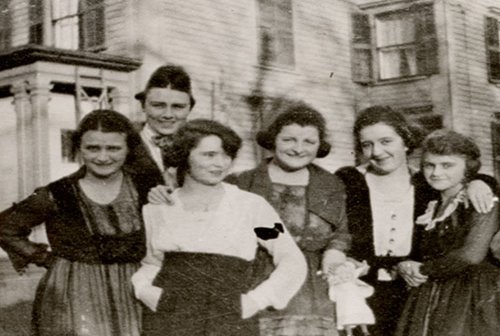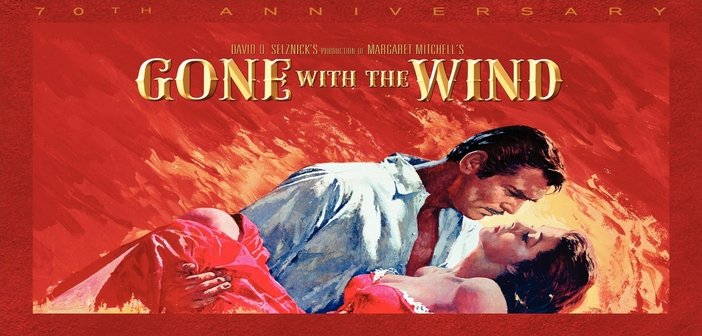Was Margaret Mitchell, author of Gone with the Wind, a feminist writer?
I first read Gone with the Wind when I was ten years of age. It was a Christmas present from my mother, which may have seemed bizarre at the time given that I wasn’t allowed stay up to watch Dallas on a Saturday night until some years later. But as you may have gleaned from previous posts of mine, my mother was a force to be reckoned with, and there was always some logic behind her thinking. For starters, there wasn’t that much B.E.D. in it (the main measure on which my mother based her version of the watershed), and secondly, how bad is it to let your daughter know that it’s not beyond the realms of possibility that the female lead in a novel could be her own heroine?
There is a lot of talk these days of feminist writers with women’s issues never being so much to the fore in modern literature. Books like Asking for It by Louise O’Neill and About Sisterland by Martina Devlin are currently storming the charts and it is an exciting time to be a female fiction writer. But could Margaret Mitchell be called a feminist writer? Born in 1900 she was definitely ahead of her time as a young woman growing up in the southern states of America. When she was just a toddler, her dress caught fire one day which caused her mother to dress her in her brother’s trousers for many years later. As a result she became known as ‘Jimmy’ to friends and family and indeed it’s said that this continued until she was almost fourteen. Quite the tomboy anyway – albeit one that still played with dolls – the fact that Margaret’s mother, May Belle, was an avowed suffragette had to have had a strong influence on the young writer’s life. [pullquote]the fact that Margaret’s mother, May Belle, was an avowed suffragette had to have had a strong influence on the young writer’s life. [/pullquote] It was May Belle that insisted on Margaret attending college, choosing Smith College in Massachusetts as she believed that only the northern colleges could offer young ladies the same education as was available to young men. Her mother had witnessed first-hand how the Civil War had caused the seemingly secure world of the South to ‘explode beneath people’ and had warned the young Margaret that some day her own world was going to explode underneath her and ‘God help her if she didn’t have some weapon to meet the new one’. The irony of this was that it was due to her mother’s untimely death in 1918 that Mitchell’s college years were cut short. She returned home to find that her mother had written her a note with one last piece of advice.
“Give of yourself with both hands and overflowing heart, but give only the excess after you have lived your own life.”

Was it because of advice like this that in her Pulitzer Prize winning novel, Gone with the Wind, she managed to create the strongest, most independent and fiercely determined female character of all time? She had started writing at an early age. Initially the stories were about animals and, later, fairy and adventure stories. But her hand inevitably turned to romance and in her teenage years she wrote her first novel, Lost Laysen, whose theme of love and honour would later be repeated with greater finesse in GWTW.
Gone with the Wind was indeed a story about a strong woman who overcomes all odds to care for her family, but is it right to call it a feminist novel? Even I, as a huge fan, think that is stretching it. Yes, Scarlett is strong, determined, hard working – in the course of the novel we see her go from sixteen year old debutante to a twenty-eight year old thriving businesswoman – but feminist? I don’t think Scarlett gave a ‘fiddledeedee’ about other women – she only cared about herself and her beloved home, Tara. And that’s before I mention the fact that all of the strong female characters in the book – Scarlett; her beautifully serene mother, Ellen, and even ‘mealy-mouthed Melanie Wilkes’ are all white. The black women characters in the book don’t fare so well. Prissy is perceived as a simpleton (albeit decidedly more so in the movie than the book itself), and Mammy, despite her being a very definite “strong character” is still a slave. Unfortunately, being a feminist does not rule out still being a racist and even though in the 1939 movie of Gone with the Wind the racial undertone was softened to make the black characters all look pretty happy with their lot, the fact remains: Scarlett O’Hara was happy to have slaves. In fact, not only did she have slaves but she managed to hang onto them after emancipation, and even resorted to using convicts to work in her lumber mills long after the war was over.

But then that leads us to the age old question nicely, doesn’t it? Do “good” characters also have to be likeable? If the answer is yes, then Scarlett O’Hara definitely has a battle on her hands. She is scheming, she is ruthless, and she is most definitely bereft of any conscience. Not only does she steal two men from other women (and let’s face it, men were already pretty thin on the ground with that whole war thing going on), she devotes her life to stealing a third and in the middle of all this actually murders another one.
So what could my mother possibly have seen in such a ruthless, dubious character that she felt I should know about her?
Well Gone with the Wind was never meant to be a book about feminism. It couldn’t have been, not least because there’s a pretty dubious scene where the ‘cad’ Rhett Butler sweeps Scarlett off her feet and over one shoulder to the bedroom (Blurred Lines, anyone?). But then who ever said it was meant to be a feminist book? Definitely not Mitchell herself. Indeed when she was asked about the theme of the book, her answer was pretty definitive, and not an ‘f’ word in sight.
[pullquote]“If the novel has a theme, it is that of survival. What makes some people come through catastrophes and others, apparently just as able, strong and brave, go under?”[/pullquote] “If the novel has a theme, it is that of survival. What makes some people come through catastrophes and others, apparently just as able, strong and brave, go under? It happens in every upheaval. Some people survive, others don’t. What qualities are in those who fight their way through triumphantly that are lacking in those that go under? I only know that survivors call that quality ‘gumption’. So I wrote about people who had gumption and people who didn’t.”
I can actually relate to this. My own book, The Fallout, is set just after our own recession here in Ireland and deals with how some people made some very poor decisions in the name of survival. It happens all over the world, I’m sure; people making choices about whether to be the locust or the collateral damage when life is no longer as they know it and drastic measures are called for.
And thereby lies the reason that I think I was given that book at such a young age. I’m not sure if my mother was a feminist. I doubt she ever had too much time to think about it, really. But as she was forced to give up work because, at that time, there was a law that stated that women working in the Civil Service could not be married, I would imagine that my mother wanted more for her girls. Our education was paramount and there was always the advice that we should have our ‘own money’ because ‘sometimes a rainy day comes and you have to be your own umbrella’.
And it’s valuable to remember that in the 1930s when this book came out, the women reading it had just come out of their own recession and were ripe for an inspiring story of strength and determination. And I’m not going to lie, there was an evening not so long ago when I spotted an ad promoting the fact that the Ideal Homes Exhibition was starting back up again. And I remember my favourite Scarlett moment coming to mind: her green eyes flashing when she heard the war might be over, everyone else sobbing about the possible return of the menfolk, but her with only one thing on her mind.
“It’s over – now the price of cotton outta go sky high.’
There’s no denying that there’s a lot to be said for a bit of gumption.
Featured images:
dvdsreleasedates.com
irishamerica.com
smith.edu

